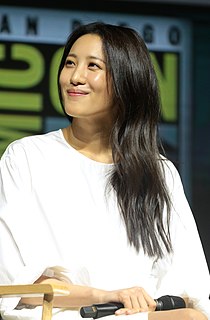A Quote by Sally Field
It took me getting to my 50s before I could say "Whatever!" about other people's criticism, especially when it's not true.
Related Quotes
I began to understand that there were certain talkers - certain girls - whom people liked to listen to, not because of what they, the girls, had to say, but because of the delight they took in saying it. A delight in themselves, a shine on their faces, a conviction that whatever they were telling about was remarkable and that they themselves could not help but give pleasure. There might be other people - people like me - who didn't concede this, but that was their loss. And people like me would never be the audience these girls were after, anyway.
Whatever way you put it, I am here only because my world is here. When I took my first breath, my world was born with me. When I die, my world dies with me. In other words, I wasn't born into a world that was already here before me, nor do I live simply as one individual among millions of other individuals, nor do I leave everything behind to live on after me. People live thinking of themselves as members of a group or society. However, this isn't really true. Actually, I bring my own world into existence, live it out, and take it with me when I die.
I think online, like on YouTube and stuff, people could pretty much say whatever they want. They have no filter in their brain, because no one knows who they are. They're totally anonymous, so they could say whatever they want. But when they're in person with me, they wouldn't say those things, because I can actually see who they are.
Let's say for instance people say, "He's a really totalitarian, strict guy, he's hard to work with or whatever." I don't think it's true, but people's perception of me leads that direction, like I'm a fundamentalist person. I end up having to spend extra time saying, "I'm not a fundamentalist." I have other stuff to do.
I've said jokes where I thought people might get up and hit me for this. A couple of people have thought about it. But they didn't. It gives you a lot of power, because if you're on shows where people are worried about getting sacked and you're not, then you're transcendent because you say what other people would like to say.
I learned a tremendous amount about what was important to me as a head coach in that I was not in charge. I didn't have final say about what was going on, and I was always having to represent other people's views, and it was very difficult to be real, to be authentic, to be true because there were a number of people who had say about what was going on.
The core of Animal House was about prejudice, about equality, and about inclusion/exclusion. It was about a group of people who were together and anything went. Anybody who wanted in could get it in. Then there was that other group that nobody could get in, unless they were white, and just alike. It was very representative of the culture in the '60s, '50s, and '40s in America.
To me, there's a huge difference between criticism and reviewing. I really love reading good criticism of television and film. To me, a critic is someone who analyzes a show, describes it, talks about the people in it, puts it in historical context of other shows like it, compares it and stuff, and then talks about the intent of the show and whether it failed or didn't.



































